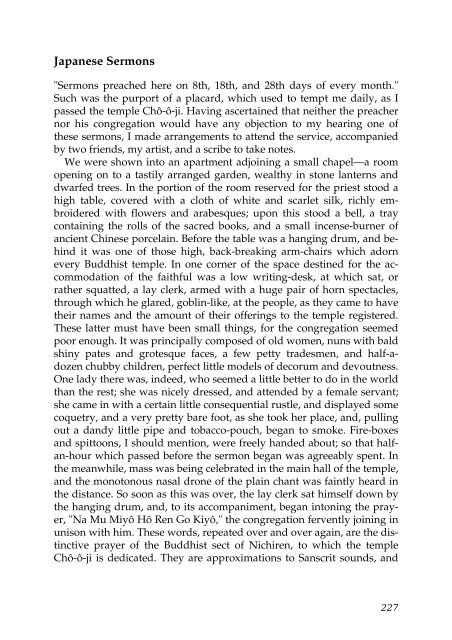You also want an ePaper? Increase the reach of your titles
YUMPU automatically turns print PDFs into web optimized ePapers that Google loves.
<strong>Japan</strong>ese Sermons<br />
"Sermons preached here on 8th, 18th, and 28th days <strong>of</strong> every month."<br />
Such was the purport <strong>of</strong> a placard, which used to tempt me daily, as I<br />
passed the temple Chô-ô-ji. Having ascertained that neither the preacher<br />
nor his congregation would have any objection to my hearing one <strong>of</strong><br />
these sermons, I made arrangements to attend the service, accompanied<br />
by two friends, my artist, and a scribe to take notes.<br />
We were shown into an apartment adjoining a small chapel—a room<br />
opening on to a tastily arranged garden, wealthy in stone lanterns and<br />
dwarfed trees. In the portion <strong>of</strong> the room reserved for the priest stood a<br />
high table, covered with a cloth <strong>of</strong> white and scarlet silk, richly embroidered<br />
with flowers and arabesques; upon this stood a bell, a tray<br />
containing the rolls <strong>of</strong> the sacred books, and a small incense-burner <strong>of</strong><br />
ancient Chinese porcelain. Before the table was a hanging drum, and behind<br />
it was one <strong>of</strong> those high, back-breaking arm-chairs which adorn<br />
every Buddhist temple. In one corner <strong>of</strong> the space destined for the accommodation<br />
<strong>of</strong> the faithful was a low writing-desk, at which sat, or<br />
rather squatted, a lay clerk, armed with a huge pair <strong>of</strong> horn spectacles,<br />
through which he glared, goblin-like, at the people, as they came to have<br />
their names and the amount <strong>of</strong> their <strong>of</strong>ferings to the temple registered.<br />
These latter must have been small things, for the congregation seemed<br />
poor enough. <strong>It</strong> was principally composed <strong>of</strong> old women, nuns with bald<br />
shiny pates and grotesque faces, a few petty tradesmen, and half-adozen<br />
chubby children, perfect little models <strong>of</strong> decorum and devoutness.<br />
One lady there was, indeed, who seemed a little better to do in the world<br />
than the rest; she was nicely dressed, and attended by a female servant;<br />
she came in with a certain little consequential rustle, and displayed some<br />
coquetry, and a very pretty bare foot, as she took her place, and, pulling<br />
out a dandy little pipe and tobacco-pouch, began to smoke. Fire-boxes<br />
and spittoons, I should mention, were freely handed about; so that halfan-hour<br />
which passed before the sermon began was agreeably spent. In<br />
the meanwhile, mass was being celebrated in the main hall <strong>of</strong> the temple,<br />
and the monotonous nasal drone <strong>of</strong> the plain chant was faintly heard in<br />
the distance. So soon as this was over, the lay clerk sat himself down by<br />
the hanging drum, and, to its accompaniment, began intoning the prayer,<br />
"Na Mu Miyô Hô Ren Go Kiyô," the congregation fervently joining in<br />
unison with him. These words, repeated over and over again, are the distinctive<br />
prayer <strong>of</strong> the Buddhist sect <strong>of</strong> Nichiren, to which the temple<br />
Chô-ô-ji is dedicated. They are approximations to Sanscrit sounds, and<br />
227



